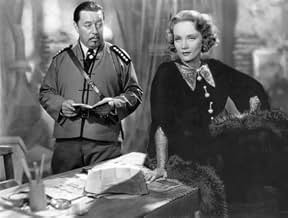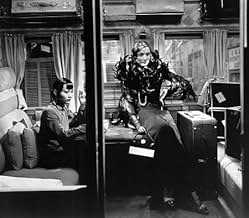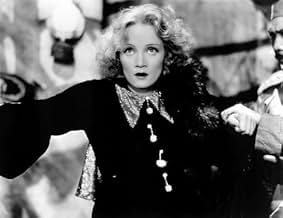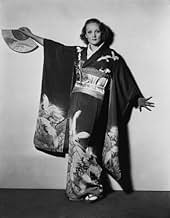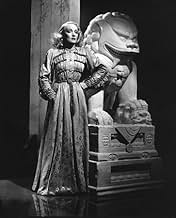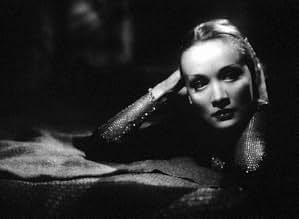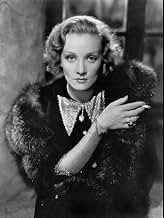अपनी भाषा में प्लॉट जोड़ेंA notorious woman rides a train through a dangerous situation with a British captain she loved.A notorious woman rides a train through a dangerous situation with a British captain she loved.A notorious woman rides a train through a dangerous situation with a British captain she loved.
- निर्देशक
- लेखक
- स्टार
- 1 ऑस्कर जीते
- 2 जीत और कुल 2 नामांकन
- Dr. Professor Jack
- (बिना क्रेडिट के)
- Minor Role
- (बिना क्रेडिट के)
- Carey
- (बिना क्रेडिट के)
- Chinese Soldier
- (बिना क्रेडिट के)
- Chinese Officer Checking Passports
- (बिना क्रेडिट के)
- British Officer at Shanghai
- (बिना क्रेडिट के)
- British Railway Officer
- (बिना क्रेडिट के)
- Undetermined Secondary Role
- (बिना क्रेडिट के)
- Train Engineer
- (बिना क्रेडिट के)
फ़ीचर्ड समीक्षाएं
Leaving for Shanghai to operate on the stricken British Consul-General, army physician Clive Brook climbs aboard only to find the woman he loved but lost five years ago (Dietrich). Now, however, she goes by another appellation; as she explains, in the script's most emblematic line, `It took more than one man to change my name to Shanghai Lily.' Her presence on the train, and that of one of her sisters-in-sin (Anna May Wong) is cause for scandal and indignation among the other passengers: prim boarding-house proprietress Louise Closser Hale (with her pooch Waffles smuggled on board); sputtering man of the cloth Lawrence Grant; sardonic gambling man Eugene Pallette; a Frenchman; a German; and the inscrutable, pre-Charlie Chan Warner Oland.
Soon, China being embroiled in a civil war, they have more to worry about than Dietrich's morals. Rebel troops halt the journey lead the passengers, one by one, to be interrogated by their warlord, who turns out to be Oland. The various eccentricities, secrets and agendas of the passengers get brought into the open, affording Oland opportunity to avenge any number of racial and personal slights. But finally he finds what he's been looking for a valuable hostage to serve as a bargaining chip in Brook. And from then on Shanghai Express becomes a drama of reckoning, with all the characters scheming to save their own (and occasionally one anothers') skins.
None of the players can be faulted, except for Brook, who gives a dead-earnest impersonation of the stick that stirs the fire; that Dietrich should have fallen for him is like believing several impossible things before breakfast. (Cary Grant was around in 1932; too bad Sternberg didn't catch up with him until his next movie, Blonde Venus.) But in his handling of Dietrich, Sternberg all but patents what came to be called star treatment. Stunningly lighted, her feline face is caught in a breathtaking range of moods and attitudes. But she's more than a passive vessel for the director's intentions her blend of worldly savvy and steely spine is hers and hers alone.
She isn't the only beneficiary of Sternberg's eye. He shoots the movie in a haunting, intense chiaroscuro (few movies from this early in the 1930s were so richly and handsomely photographed). He cuts from scene to scene teasingly, layering new shots on fading images, adding a little rubato to relate incidents of the story to one another. Shanghai Express may be the first masterpiece of the sound era, one that's still no less extraordinary today than it was 70 years ago.
Essentially, the movie is Ms. Dietrich's star vehicle, kit up with astounding sartorial creations from Travis Banton, and looks gorgeously photogenic under von Sternberg's meticulous coordination, she plays a courtesan named Shanghai Lily, of all people, she chances upon her ex-lover, British Captain Donald "Doc" Harvey (a stiff upper-lipped Brook) on the express, while the pair's romance duly begins to rekindle, Chang and his rebellious rabble hijacks the train and detains Doc as a valuable hostage, soon, it falls to two women's hands to take the situation out of jeopardy, one is Shanghai Lily, who acquiesces to Chang's commander for the sake of Doc's safety, another is her companion, a Chinese working girl Hui Fei (a piercing-looking Wong, the first Chinese-American star in Hollywood), who successfully lands on her feet after a vengeful assassination.
Sardonically, the rest western passengers are more or less one-note laughing-stocks, casual scorn is cast upon an opium merchant and self-professed "invalid" Eric Baum (von Seyffertitz), a priggish Reverend Carmichael (Grant) and a congenital bettor Sam Salt (Pallette), whereas Henry Chang is accountable for all the contempt, conversely it is the gamble of love and faith that transpires after its torpid escape hubbub, and it is Shanghai Lily's clandestine repentance finally softens the film's cynical temperament and veers into the usual trajectory of a cheesy romance, but what an extravaganza is on show, von Sternberg's expressionistic idiom would totally normalize the standards we view movies even today, whether it concerns narrative cohesion, the marshaling of a huge set, or spectacular montage arrangements, no wonder audience at that time could rapturously fall under his spell, SHANGHAI EXPRESS is the highest grossing movie of 1932, even today, it demands our collective gaze.
Despite the fact that the entire film is produced in either a Hollywood lot or a train depot in San Bernardino, I feel that I am in China during very turbulent and dangerous times. Thanks to the special skills of director Josef von Sternberg, the prevailing sense of impending peril is very strong. Warner Oland, although not even half Chinese, is very convincing as the menacing rebel leader. The rest of the cast is excellent as well. Both Dietrich and Brook project an outward appearance of stiffness and toughness to the dangerous world around them, but we learn along the hazardous and uncertain journey that their exterior façade is nothing but a thin disguise, and there lies a very vulnerable humanity deep within both of them. Dietrich gives another one of her many fascinating performances, full of psychological complexity. I love her.
I don't understand all of the harsh criticism of Clive Brook among the user reviews here that he is too wooden and mechanical. That is exactly the way he was supposed to play the role of a military doctor living in a world full of danger and of extreme hostility that is specifically aimed at him and his uniform. If we watch him closely, we will observe the decent, compassionate man behind the uniform. I thought that Dietrich and Brook make a smashing couple, especially when their outward and superficial veneer crumbles before our very eyes. This is good stuff!
The beautiful and mysterious Ana May Wong also provides complexity and depth to her deceiving, outward impression as Lily's courtesan companion, Hui Fei. Again, we must not judge Hui Fei based on her exterior demeanor alone because deep within her lies a very brave and determined dedication to her country and to her society. Her exchanges with Mrs. Hegarty (Louise Closser Hale), the prim and proper boarding house owner, are most entertaining. I'm usually not focused on hairdos, but check these out, especially Hegarty's. Holy mackerel.
As you will see, none of the characters are what they seem to be at first glance. That is only part of what intrigues me about this movie. Please don't miss this extraordinary train, which only leaves the station on rare occasions. If you don't appreciate the ride as much as I do, you can always get off when the next cow decides to wander into its path but, considering the danger lurking in every direction, you will probably be safer on it than off it. Be forewarned and sit tight until the end. You won't be disappointed.
Plot finds Shanghai Lily (Dietrich) meeting up with old flame Donald Harvey (Brooks) aboard the Shanghai Express during the Chinese Civil War in 1931. However, this train has many passengers with secrets to hide, so when some rebels ambush the train, such things as loyalties, friendships, hidden motives and the birthing of legends come to the fore.
Stylishly crafted by Sternberg and brisker than the other collaborations with Dietrich, Shanghai Express thrives on atmospheric visuals, strong scripting and a sultry turn from the leading lady. The cramped confines of the train allow Sternberg to dally with trademark shadows, smoke and shafts of light for maximum effect, garnering Garmes an Oscar in the process, while there is deft deadpannery amongst the myriad of intriguing characters.
Quality film making on both sides of the camera and also off of the writers desk. 8/10
"Shanghai Express" is a great Pre-Code Film with magnificent performances of the gorgeous Marlene Dietrich and Anna May Wong. The melodramatic romance about the lack of faith in love and the recounter of two former lovers in the environment of the Chinese Civil War in 1931 is engaging with wonderful black and white cinematography. Marlene Dietrich deserved a better romantic pair since the wooden Clive Brook does not have good performance. My vote is seven.
Title (Brazil): "O Expresso de Shanghai" ("The Shanghai Express")
क्या आपको पता है
- ट्रिवियाThe extras in the film mostly speak Cantonese - a Chinese dialect used mainly in southern China. If the film were to be more accurate, the extras would speak Mandarin, but most Chinese residents in the Los Angeles area (who worked as film extras) spoke Cantonese, necessitating Josef von Sternberg use Cantonese. Even so, Cantonese was spoken by a lot of Chinese as Mandarin gradually gained ground.
- गूफ़The film is set in northern China (Peking to Shanghai). The government and warlord soldiers are speaking Taishanese, which is a southern Chinese dialect not generally spoken in northern China. The northern dialects of Mandarin Chinese (a Beijing dialect) and/or Shanghainese would be spoken instead.
- भाव
Mr. Henry Chang: All the money in the world can't wipe out his insult to me.
[Shanghai Lily tries to shoot him]
Mr. Henry Chang: You only had my interest before. Now you have my admiration. I could love a woman like you.
Shanghai Lily: You made me an offer to leave with you. Does it still hold good?
Mr. Henry Chang: I wouldn't trust you from here to the door. What assurance have I you won't trick me?
Shanghai Lily: I give you my word of honor.
Mr. Henry Chang: A man is a fool to trust any woman, but I believe a word of honor would mean something to you.
- इसके अलावा अन्य वर्जनComments in the AFI Catalogue suggest the credits were changed when re-released in 1935. According to the Catalogue, the original print referred to Harry Herveys work as a novel. In the viewed print on TCM, the onscreen credit was "story." The print was clearly a re-released print because of the PCA certificate number listed onscreen; such numbers were not issued until 1934. It is not known what other changes were made, if any, but the print ran only 82 minutes, suggesting some additional editing had been done.
- कनेक्शनFeatured in Without Regret (1935)
टॉप पसंद
- How long is Shanghai Express?Alexa द्वारा संचालित
विवरण
- रिलीज़ की तारीख़
- कंट्री ऑफ़ ओरिजिन
- भाषाएं
- इस रूप में भी जाना जाता है
- El expreso de Shanghai
- फ़िल्माने की जगहें
- उत्पादन कंपनी
- IMDbPro पर और कंपनी क्रेडिट देखें
- चलने की अवधि1 घंटा 22 मिनट
- रंग
- पक्ष अनुपात
- 1.37 : 1
इस पेज में योगदान दें


